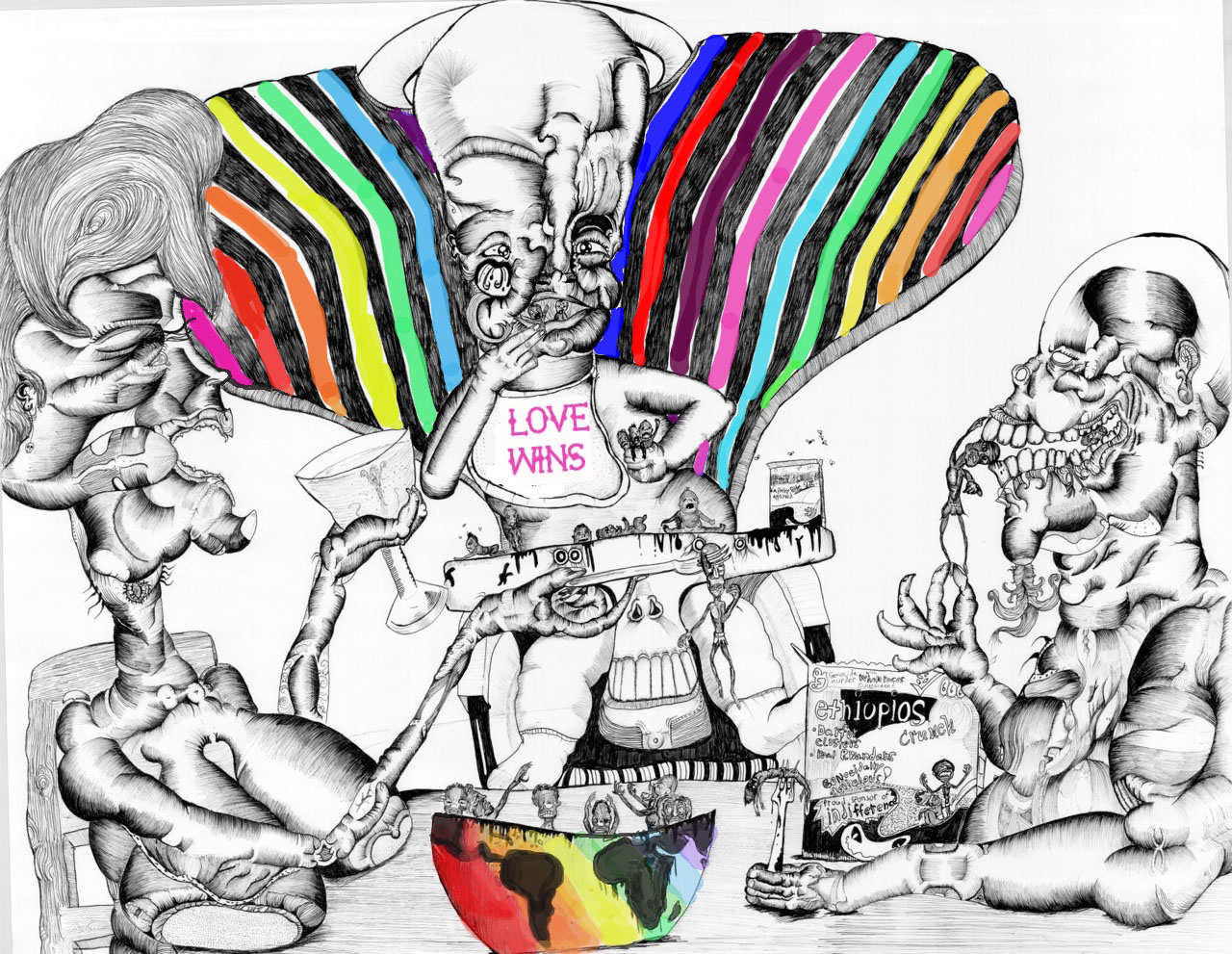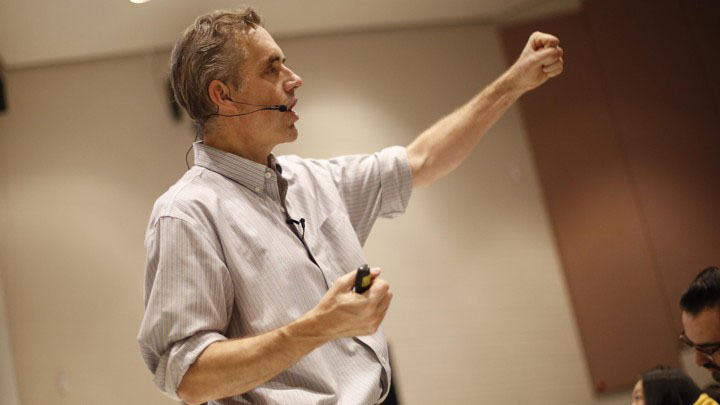
There are—the teary-eyed politicians tell us—primitive peoples still darkly groping about in this current year without the blessings of our own enlightened, Western sexual values. President Trump has, therefore, pledged to civilize these backward lands, waging war against the criminalization of homosexuality. His announcement came soon after a report of the Iranian government hanging a 31-year-old man found guilty of kidnapping and raping two 15-year-old boys. All sodomy being illegal there, many news agencies thought it just to include this child rapist among the persecuted LGBT minority in Iran. In this case, it is likely the Trump administration is using gay rights as a thin pretext to gain leverage over Iran. After all, the difference between an act of aggression and one of emancipation is only a rainbow sticker away. However, global LGBT rights conforms to a larger design. To mobilize an entire worldwide campaign on behalf of a relatively minor subdivision of the populace may seem extravagant, but there is a colonial logic at work here. Sexual freedom is merely the foundational preamble to the greater liberation—that of capital.
“Sexual freedom is merely the foundational preamble to the greater liberation—that of capital.”
Gender, we are told, is a social construct. Surely there is some truth to this. It follows then that different social arrangements will, therefore, effect a variety of sexual identities. Foucault himself, darling of the Left, documented the construction of the modern homosexual identity, birthed, he asserted, in the 19th century amidst the medicalization of sexuality. It was around this time, he concluded, that sodomy ceased being an act and began being a part of the innermost essence of one’s personality.
Undoubtedly, there are individuals, in the Middle East and elsewhere, who engage in sodomy, but—confoundingly—this does not mean they necessarily construct identities around such acts, and certainly not in the same manner Westerners do. The West is exporting its own culturally determined notions of sexuality while arrogantly presuming their universality. It is a Euro-American styled homosexuality that has little to do with foreign sexual identities. And, as Edward Said reminds us, “imperialism is the export of identity.”
The European man, in some Rousseauian fever dream, imagines a universal man abstracted from history, the pure subject. And lo! He fits the mold of a 21st century, white, middle class cosmopolitan—l’homme naturel, primitive, without civilization, grunting in the wilderness—listening to NPR and reading The Washington Post.
One of Columbia’s own, Joseph Massad, Professor of Modern Arab Politics and Intellectual History, has reiterated just this for years in his work. With a fanaticism surpassing the Catholic Church at the height of its evangelical zealotry, Massad says the pressure for gay rights in the Middle East is the result of a “missionary” campaign orchestrated by what he calls the “Gay International.” In his book Desiring Arabs, he writes, “It is the very discourse of the Gay International which produces homosexuals, as well as gays and lesbians, where they do not exist.” He makes the further point that “it is the publicness of socio-sexual identities rather than the sexual acts themselves that elicits repression,” and that in forcing Arabs who engage in same-gender sex to go public, “the Gay International is destroying social and sexual configurations of desire in the interest of reproducing a world in its own image.”
Although it concerns the Arab world, Massad’s analysis is applicable to other countries as well. In Russia, for example, gay bars operate openly and unmolested. Gay parades, however, are forbidden. It is not homosexuality itself, but the intrusion of it into the public sphere that Russians find objectionable.
The business of global gay enfranchisement officially began with President Obama making LGBT rights a cornerstone of his foreign policy. More than $41 million went toward the glitter industrial complex, along with a portion of $700 million earmarked for marginalized groups to support gay communities and causes worldwide. A substantial amount was allotted to the crisis in Sub-Saharan Africa, apparently in urgent need of gay pride parades. For other minor discomforts—starvation, high infant mortality rates, AIDS, staggering poverty, and so forth—Obama strategically used the threat of discontinuing developmental assistance as a weapon to bully and force African states into decriminalizing homosexuality. After Uganda’s president signed a tough anti-gay law, for example, the Obama administration swiftly announced that aid money would be cut off or redirected.
Concurrently, the World Bank announced that it was delaying a US$90 million loan to Uganda on the grounds that the law would adversely affect health programs which the loan was intended to support. A puzzling stance for a bank. They justified the decision by asserting, “when societies enact laws that prevent productive people from fully participating in the workforce, economies suffer.” Uganda’s law wouldn’t have prevented anyone from working, however, provided it demanded no labor involving sodomy.
This is part of a pattern of subverting national sovereignty for the sake of what Pope Francis calls “ideological colonization.” It is no wonder much of the Third World considers the imposition of foreign sexual values to be just another instance of white supremacy. In the journal of The African Holocaust Society, a group of African scholars argue that LGBT rights are “the gateway to Western political control over sovereign nations (Uganda, etc.) and most importantly a threat to our peoplehood and the way we choose as free agents to determine our African reality.”
In tandem with political pressures, corporations have been oddly instrumental in extolling the boons of buggery. One might argue they are merely cashing in on the fad, yet studies have shown there is little evidence that social responsibility initiatives necessarily result in positive outcomes for businesses.
The truth is, gay rights have been aggressively pursued, and defended, by big business. Hundreds of global companies, in a strange reversal of their usual social neutrality, came forth to sign amicus briefs to affirm same-sex marriage in Obergefell.
According to data from Funders for LGBTQ Issues, corporate donations account for a considerable portion of overall LGBTQ grantmaking. In 2016, that support totaled $20.4 million. More than 500 foundations and governmental agencies gave a total of $524 million to LGBT causes in 2015 and 2016 combined, almost a quarter more than in the previous two-year period.
Generous fellows, these CEOs.
And one may ask why exactly billionaire republicans, such as major GOP donor Paul Singer, are donating millions to gay activist groups. Singer, incidentally, claims the BBC, “virtually invented vulture funds.” Vulture funding, as The Guardian describes it, happens the country “is in a state of chaos. When the country has stabilized, vulture funds return to demand millions of dollars in interest repayments and fees on the original debt.”
Here we move closer to the truth. Elite-driven advances of changing sexualities foster de-normed individuals that define themselves not by family, nation, religious affiliation, or tradition, but rather through self-creation according to the liberated individual will. With this groundwork in place, corporations can then gain control of the populace by dictating and manipulating multiform identities based on nothing more than appetites atomized from any larger cultural networks.
The objective is not to create more gay people. Same-sex marriage has symbolic importance; its victory in the public square validates all other sexual relations freed from childbearing and familial constraints. Controlling the symbolic grammar of society is a stunningly effective means to achieve dominance. Homosexual couples are merely the current spearhead mobilized in the production of new normative ideals.
On the social function of liberating eros, Zygmunt Bauman has written that
The great majority of people, men as well as women, are today integrated through seduction rather than policing, advertising rather than indoctrinating, need-creation rather than normative regulation.
Free-floating eroticism is therefore eminently suitable for the task of tending to the kind of identity which, like all other postmodern cultural products, is (in George Steiner's memorable words) calculated for “maximal impact and instant obsolescence.”
It is an identity tailor made for the free market. Global-homo-capitalism disciplines, and then exports, these revolutionary subjectivities abroad.
In his famous essay “Capitalism and Gay Identity,” the historian John D’Emillo illustrates how the rise of wage labor and commodity production broke down self-sufficient households, weakened kin relationships, and produced the modern individual—having no strong ties to place, history, or community, with sex severed from social function. Now liberated from the family as a source of income, individuals could flee to the anonymity of large cities where new social norms, not dependent on family organization, allowed for distinctive homosexual identities to flourish. Sexual desire was now abstracted from the embedded social obligations inherent in child-rearing, and homosexual desire could function as the decisive factor of one’s identity.
Homosexuality is commensurate with the rise of capitalism. Countries that are actually socialist rank at the bottom of every measurement of political freedom, civil liberties, personal freedom, and LGBT rights.
In the name of individual freedom, social bonds are dissolved in the acid of market driven logic (expanded consumer choice, disposability and interchangeability of objects, merciless competition) applied to human relationships. Volker Woltersdorff, writing at the Institute for Queer Theory in Berlin, thus concludes: “Social de-solidarization is the historical precondition of the state recognition of some non-heterosexual ways of living.”
Furthermore, this requires enormous state support, for small government is incompatible with “official homosexuality.” We see in the West how ever-expanding technocratic government agencies have come to replace the old-fashioned intermediary institutions like Church and family, which used to oversee, and constrain, the discourse of norms. To secure the means of the discursive production of Euro-American gay identities massive institutional intervention is necessary.
The stable family structure based on traditional sexual identities—in generation-to-generation transmission of heritage, embedded within a larger community—must be broken down and reconstructed into the image of Homo-Neoliberal Man, of whom the homosexual—childless, self-determined and autonomous—is the ideal archetype.
Gundula Ludwig, who explores the nexus of political science and queer theory, describes how the new postmodern fluid demands of a neoliberal economy impact gender formation:
Imagining a “homosexual lifestyle” in which subjects are flexible, dynamic and self-determined configures gays and lesbians as neoliberal role models…
The diversification and pluralization of what counts as a ‘normal’ or ‘acceptable’ form of sexuality, desire, partnership or family imply that individuals and the population are governed in a way that helps them integrate neoliberal governmentality into their everyday practices and behavior.
The flexibilization of the apparatus of sexuality helps produce a social reality that presupposes the existence of neoliberal governmentality.
The objective is to replace traditionally constituted subjectivities in order to reconstitute social relations ripe for neoliberal exploitation.
At present, in most Third World nations, gay marriage is an unintelligible proposition, even for same sex couples. For them, the authority to define social relations is received from tradition and religion. The idea that one can re-define what marriage means presupposes a set of Western ideologies and social practices that have no symbolic logic in these places. Writing in the The Encyclopedia of African Religion, Molefi Kete Asante, a professor at Temple University, attests that
the overall African philosophy is that life and the reproduction of life sit at the core of human society. Men and women have children who ritualize their parents and ancestors. In the process of building community, African culture has no place, no category and no concept that can accommodate homosexuality as a way of life because it does not fit with the view that humans should reproduce in order to be remembered for eternity.
He goes on to state, “Nothing is more important than the cycle of life from the unborn to the ancestors; anything that breaks that cycle, such as homosexuality as a way of life, threatens the very core of African society and philosophy.”
The West wishes to usurp such authority and hand it over to the vast scientific and political machineries that have sprouted up like choking weeds in our own countries.
In light of the potential disruption to ancestral ways of life, shocking statements like those made recently by Kingsford Sumana Bagbin, the deputy speaker of the Ghanaian parliament, become understandable. To Theresa May’s call to overhaul anti-gay laws, Bagbin responded with scorn: “Homosexuality is worse than the atomic bomb,” he said, adding that “there is no way we will accept it in my country.”
This strategy to catalyze and reinforce socio-cultural pollution for neoliberal governance is what John Milbank has called “biopolitical tyranny.” In his words,
Heterosexual exchange and reproduction has always been the very "grammar" of social relating as such. The abandonment of this grammar would thus imply a society no longer primarily constituted by extended kinship, but rather by state control and merely monetary exchange and reproduction.
This Westoxification spreads its own, quite unique, set of beliefs, meanings, and social priorities onto sexual acts. Once contracted, it will attack social bonds until they become anemic, break down, and wither away. Foreign governmental bodies can then swiftly invade, injecting ruthless market forces into the host culture.
To install the logic of gay marriage into traditional societies, finally, is to bring about an entirely new cosmos, one amenable to neoliberal rule. Relationships, economic structures, self-understandings, even words themselves, must all undergo a radical transvaluation. The new colonial masters use the whip of ideology to remake the logos of a people. Indeed, the most endangered human right, in the end, may be the natural right to a non-western culture.

